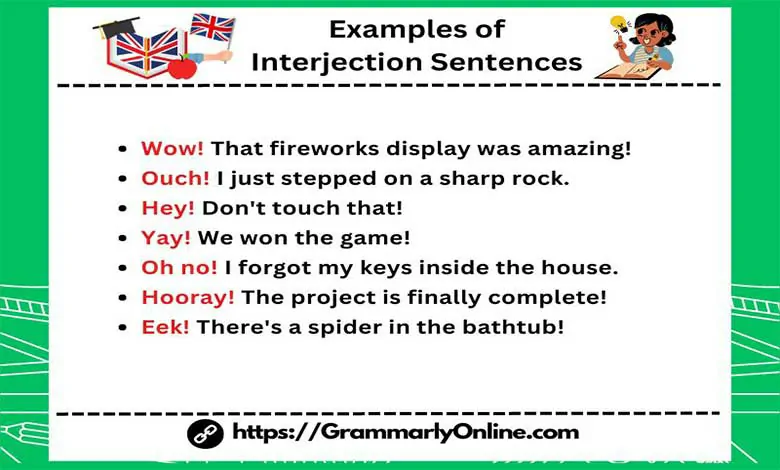10 Examples of Interjection Sentences

Interjections are an essential component of the English language, offering a rich and nuanced way to express emotions, reactions, and feelings. These words or phrases often stand alone in sentences, punctuating speech with emotional resonance. In this comprehensive article, we delve into 10 examples of interjection sentences, exploring their usage, context, and the emotional subtleties they convey.
What Are Interjections?
Interjections are words or phrases that express sudden or strong emotions. They can stand alone or be integrated into sentences, often followed by an exclamation mark. Common interjections include words like “wow,” “ouch,” “oh,” and “yay.” These words can convey excitement, surprise, pain, disappointment, and many other emotions.
Importance of Interjections in Language
Interjections play a pivotal role in communication. They add color and emotion to our language, allowing speakers to express their feelings more vividly. By using interjections, we can convey a wide range of emotions quickly and effectively, enhancing the listener’s understanding and engagement.
Example 1: Wow!
Interjection Sentence: Wow! That fireworks display was amazing!
The interjection “wow” expresses amazement and admiration. In this sentence, it emphasizes the speaker’s awe at the fireworks display, making the emotion clear and immediate.
Example 2: Ouch!
Interjection Sentence: Ouch! I just stepped on a sharp rock.
“Ouch” is used to express sudden pain. This interjection makes the speaker’s discomfort evident, allowing listeners to immediately understand the situation’s severity.
Example 3: Hey!
Interjection Sentence: Hey! Don’t touch that!
“Hey” can signal a range of emotions, from surprise to warning. In this example, it serves as a quick way to alert someone and stop an action, showing urgency and concern.
Example 4: Yay!
Interjection Sentence: Yay! We won the game!
“Yay” conveys joy and celebration. This sentence highlights the speaker’s happiness and excitement about winning the game, making the positive emotion contagious.
Example 5: Oh no!
Interjection Sentence: Oh no! I forgot my keys inside the house.
“Oh no” expresses worry or dismay. Here, it underscores the speaker’s realization of forgetting something important, adding a layer of emotional depth to the statement.
Example 6: Hooray!
Interjection Sentence: Hooray! The project is finally complete!
“Hooray” is used to express jubilation and relief. This interjection emphasizes the speaker’s happiness and sense of accomplishment upon finishing a significant task.
Example 7: Eek!
Interjection Sentence: Eek! There’s a spider in the bathtub!
“Eek” conveys fear or alarm. This example shows the speaker’s immediate reaction to an unexpected and frightening sight, making the fear palpable.
Example 8: Alas!
Interjection Sentence: Alas! Our team lost the championship.
“Alas” expresses sorrow or regret. This interjection adds a dramatic flair to the sentence, highlighting the depth of the speaker’s disappointment.
Example 9: Ugh!
Interjection Sentence: Ugh! I can’t believe it’s Monday again.
“Ugh” signifies annoyance or frustration. This interjection succinctly conveys the speaker’s displeasure at the prospect of starting a new week.
Example 10: Phew!
Interjection Sentence: Phew! I’m glad that’s over.
“Phew” expresses relief. This interjection allows the speaker to communicate a sense of release and comfort after a stressful or challenging situation.
Understanding the Context and Usage of Interjections
Interjections are versatile and can be used in various contexts. They can stand alone as complete sentences or be incorporated into larger sentences. Their primary function is to convey the speaker’s emotional state quickly and effectively. When used appropriately, interjections can enhance the expressiveness of speech and writing.
Standalone Interjections
Standalone interjections are used independently to convey a strong emotion or reaction. For example:
Wow!
In this example, the interjection “wow” stands alone, yet it clearly communicates amazement or admiration.
Integrated Interjections
Integrated interjections are woven into sentences to add emotional nuance. For instance:
I can’t believe we won the game! Yay!
Here, “yay” is embedded in the sentence, amplifying the overall emotion conveyed by the statement.
The Emotional Spectrum of Interjections
Interjections cover a broad emotional spectrum, from joy and excitement to sorrow and frustration. Understanding the specific emotion each interjection conveys is crucial for effective communication. Below, we categorize interjections based on the emotions they typically express:
Joy and Excitement
- Yay
- Hooray
- Wow
These interjections are used to express positive emotions, such as happiness and excitement. They are often employed in celebratory contexts.
Surprise and Alarm
- Hey
- Eek
- Oh no
Interjections in this category signal sudden surprise or alarm. They are useful for drawing immediate attention to unexpected situations.
Pain and Discomfort
- Ouch
- Ugh
These interjections convey physical or emotional pain and discomfort. They help express the speaker’s immediate reaction to unpleasant experiences.
Sorrow and Regret
- Alas
- Oh no
These interjections are used to express sadness, regret, or disappointment. They add a dramatic element to the speaker’s expression of negative emotions.
Relief
- Phew
Interjections expressing relief indicate the end of a stressful or challenging situation. They help convey a sense of release and comfort.
Conclusion
Interjections are a powerful tool in the English language, enriching our communication by adding emotional depth and immediacy. By understanding and using interjections effectively, we can enhance our expressive abilities, making our language more vibrant and engaging. The 10 examples of interjection sentences provided in this article illustrate the diverse range of emotions these words can convey. Whether expressing joy, surprise, pain, or relief, interjections allow us to communicate our feelings swiftly and powerfully.

